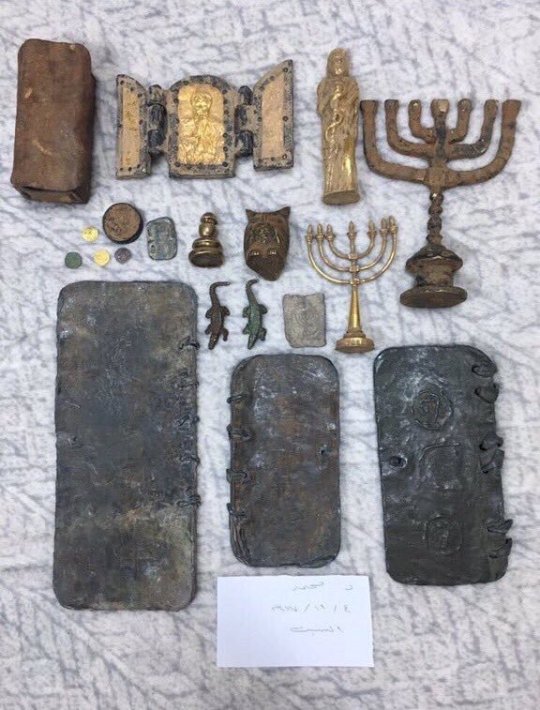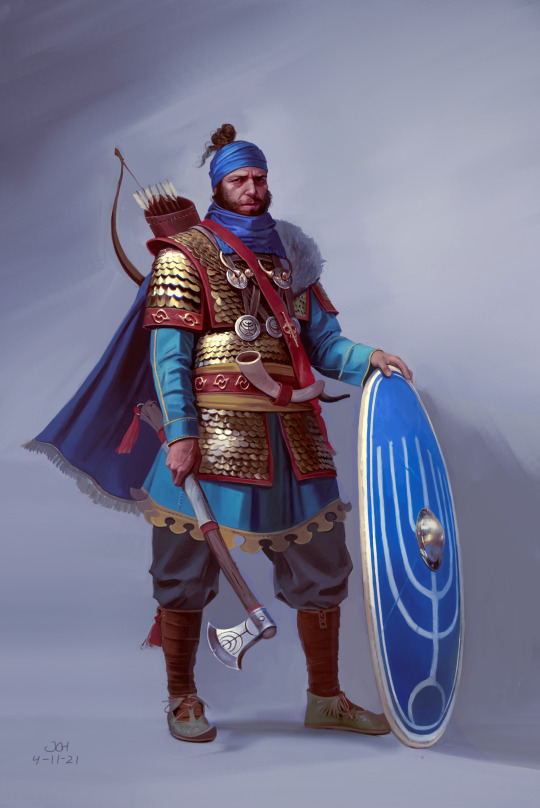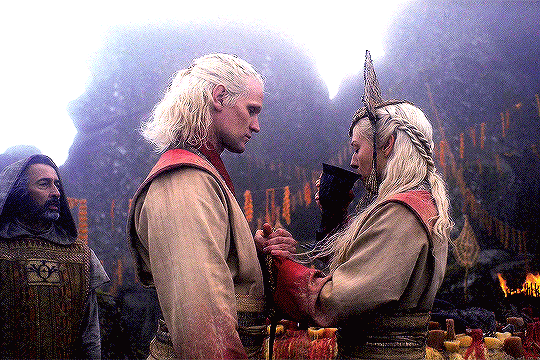#ancient judaism
Text

Happy Roge Koppur
(for WooDeeWoo)
#yom kippur#jewish history#ancient judaism#judaism#jewish#who framed roger rabbit#roger rabbit#bowser koopa#super mario bros#rogudeans#rogudea#bowsedomites#bowsedom
3 notes
·
View notes
Text
i hope y’all like historical fashion (and jews) bc i am IN LOVE w what i’m posting tmmr 🥰🥰
#art#digital art#drawing#digital illustration#artists on tumblr#my art#artist#artwork#historical fashion#ancient israel#jewish art#jewish fashion#ancient judaism
14 notes
·
View notes
Text
I frequently mourn the fact that so little is commonly known about the smaller details of traditional Jewish life. And I don't mean diaspora Jewish life, it's amazing how much we know and have preserved of various diaspora community traditions.
I mean ancient Judean lifestyles. And yes, the Torah outlines a lot of it, which is amazing. But I don't want to just know that Judean women wore jewelry or nose rings or etc, I want to be able to know what our traditional Jewish jewelry looked like. Smaller specifics instead of the broad strokes.
We can know what religious garb looked like, and even the general gist of day to day clothing. But I want to know specifically what colors people would dye their clothes for their personal tastes, the specific embroidery designs that were worn.
I want to know how traditional Judean women wore their hair, both how they wore their head coverings (knot styles, accessories for the coverings, etc) and how unmarried women would adorn their heads.
I want to know what traditional Judean makeup looked like, what toys the children played with, so so so many aspects of ancient Jewish life that I have been able to find nothing about.
Maybe, of course, I just don't know enough history. But I've tried googling these things and I have not ever found a satisfactory answer.
I wish to know what traditional, pre-occupation, pre-exile Jewish life was like.
If anyone knows anything about any of this, please please please reblog or send an ask or comment about anything you know.
This topic is of great interest to me but I'm not great at finding good history information, I've got more experience doing in-depth research on current events and politics.
573 notes
·
View notes
Text

Jewish artifacts found at an excavation site in Tayma, Saudi Arabia.
Tayma was a Jewish oasis during the pre-Islamic era. It was the hometown of Jewish poet Shmuel Ben Adiya, famous for his unconditional loyalty towards Prince Imru al Qais in the 6th century.
Tayma, along with Khaybar were the two most important oasis in the Hejaz region (modern Saudi Arabia) that used to have a strong jewish presence until the fall of Khaybar in 628 (4388 - 4389 in the hebrew calendar) when the first muslims conquered the fortress and expelled most of the jewish population.
#archaeology#jewisharchaeology#judaism#jewish#jewishhistory#jews#history#ancienthistory#ancient#saudiarabia#saudihistory#khaybar#tayma#artifacts#preislamic#israel#israeli
997 notes
·
View notes
Text
One of the funniest forms of religion-focused antisemitism to me is when people take issue with Jewish observance for being "archaic" or "stuck in the past" — and then most of the examples they cite are things that set us apart but have absolutely nothing to do with time period.
Like... guys, I'm pretty sure people who lived centuries ago thought keeping kosher was just as weird as you think it is now. This is not the innovative modern take that you think it is.
Sometimes cultural practices in the same era are just different. That's okay.
#jumblr#judaism#orthodox judaism#antisemitism#dandelion says#jewish dandelion#judaism is an ancient tradition#and so is prejudice against judaism#so if I'm stuck in the past then I guess you are too
1K notes
·
View notes
Text

A Tale of Two Coins - 2000 years apart!
On the right is a Judea Capta coin from 71 AD, 1952 years ago. The coin says “Judea conquered" in latin. These were commemorative coins originally issued by the Roman Emperor Vespasian to commemorate the capture of Judea and the destruction of the Jewish Second Temple by his son Titus in 70 CE during the First Jewish Revolt. On one side of the palm tree is a weeping defeated Jewish woman. On the other a victorious Roman soldier.
On the left, we see the same palm tree representing the Jewish homeland, but instead of a Roman soldier, there is a Jewish woman holding a baby up to the heavens symbolizing the rebirth of the Jewish people like a phoenix out of the ashes. In place of the weeping woman is a Jewish farmer (her husband) planting new roots for the Jewish people in the Jewish homeland. Instead of “Judea Capta'' the words read - “Israel Liberated 1948″.
These two coins sum up the history of exile and return of the indigenous Jews to the Kingdom of Israel.
In the prophetic words of the Bible: “They who sow in tears shall reap in joy.” (Psalm 126)
#secular-jew#israel#jewish#judaism#israeli#jerusalem#diaspora#secular jew#secularjew#islam#coins#ancient coins#judean coinage#judea#samaria#romans#judea capta#vespasian#titus#emperor#roman empire#Israel liberated#1948#hamas#coinage#second temple#1st century#palestine#Palestinian#gaza
366 notes
·
View notes
Text

Painting I made a few years ago as a part of my ancient history series. This is an elite warrior from ancient Judea, Second Temple Era. As always I find a great joy in finding the balance between historical accuracy and personal interpretation. Hope you like it!
All the best,
JCH
#dungeons and dragons#board games#concept art#fantasy art#tabletop games#magic the gathering#digital painting#character design#ancient history#armor#jewish#jewish history#judaism#ancient judea#ancient israel#warrior#ancient rome
92 notes
·
View notes
Text
Valyrian Wedding Rituals & Its Parallels






“Among the people who came to inhabit Northumbria and the Lothians, as well as among other Germanic peoples, the nuptials were completed in two distinct phases. (…) The parties plighted their troth and the contract was sealed, like any other contract, by a hand-shake. This joining of hands was called handfæstung in Anglo-Saxon, and the same word is found in different forms in the German, Swedish and Danish languages. In each it means a pledge by the giving of the hand.”
Handfasting' in Scotland - The Scottish Historical Review; Anton, A. E. (1958)
“In ancient Rome, a wedding was a sacred ritual involving many religious practices. (…) In a Roman wedding both sexes had to wear specific clothing. Men had to wear the toga virilis while the bride to wear a wreath, a veil, and a yellow hairnet.”
Women's Costume and Feminine Civic Morality in Augustan Rome; Sebesta, Judith Lynn (1997)
“ When the terms of the ketubah were accepted a cup of wine was shared to seal the marriage covenant. (…) The bride and groom shared the same cup, symbolizing the shared life that would be theirs. (…) Wine in Judaism has always symbolized joy. (…) Wine also symbolized blood. The marriage covenant is a blood covenant in the eyes of God. Two lives become one in a lifelong commitment.”
The Ancient Jewish Wedding; Lash, Jamie (2012)
#daemon targaryen#daemon x rhaenyra#daemyra#hotd#fantasy#game of thrones#rhaenyra targaryen#house of the dragon#house targaryen#asoiaf#wedding vows#old valyria#ancient rome#roman empire#roman history#jewish history#judaism#jewish culture#celtic paganism#scottish
209 notes
·
View notes
Text
as the holidays come to a close, i'm left to wonder....
how does religion work in the pjo universe?
#pjo#percy jackson#percy jackon and the olympians#percy series#pjo series#pjo tv show#pjo hoo toa#pjo fandom#percy pjo#annabeth pjo#like i know rick riordan is a white goyische man#so he probably didn't think this through and just assumed that they all celebrated Christmas culturally#but how does religion play in the pjo universe#even if you're like christian do you just leave religion when you come to camp#like i understand that most kids are pretty irreligious and probably won't care about leaving religion#but as someone who went to religious school there's at least one kid who is devout as fuck and'll just keep practicing#also like plenty of religions practiced today are the same age as the ancient greek religion- ex. judaism and hinduism#how does that clash work-there were exchanges of jewish and hindu culture in the ancient greek era so it's safe to assume jewish and hindu#half-bloods would exist#also on the hindu can of worms- we are also a polytheistic religion#does belief in that renounce any connection to the greek gods#also the comedic potential of the clash in SO underutilized#i can see luke at some point just scraping the food into the hermes fire saying 'accept my offering- o g-d who is NOT greek'#or some other camper reciting the brahmarpanam or offering Du'a while offering food to the gods#you can't tell me at least one kid yelled up at the sky 'well i'm converting now! fuck you dad!'
91 notes
·
View notes
Text

The mosaic floor and table of the Sardis Synagogue, which was the largest synagogue in the ancient world. The Jewish community of Sardis, a city in western Turkey, dated back to the third century BCE, when a local king invited Jews from all over the region to resettle there.
{WHF} {Ko-Fi} {Medium}
621 notes
·
View notes
Text

You can try all you want, their cultural and historical roots will always remain🫒
🇵🇸🌳🇵🇸
#history#olive tree#palestine#gaza#olive oil#ancient history#traditional practices#food#abrahamic religions#cottagecore#palestinian history#anti zionisim#apartheid israel#free palestine#free gaza#food history#palestinian culture#judaism#christanity#islamic#jewish history#christian history#islamic history#ancient#philistines#from the river to the sea palestine will be free#nickys facts
77 notes
·
View notes
Text
Kolkata once had a thriving Jewish community but over the last few decades it has dwindled. Today the city’s last few synagogues are cared for by Muslim caretakers.
132 notes
·
View notes
Text
Lancer lore about religions I completely made up:
During the Fall, the Ka'ba was hit by a direct nuclear strike.
In spite of this, after the founding of Union the Black Stone was encased in a transparent anti-radiation container and it became a site of pilgrimage once more.
In modern times, maktebas of the @albatross-lancer often dedicate part of their resources to transporting or escorting pilgrims to their nearest Blinkgate, and at least one, despite remaining secular, has dedicated itself almost entirely to this purpose.
Meanwhile, the search continues for the Temple of Jerusalem, as its historical location was found empty during the Little Wars and the few remaining records about it imply it was wholly dismantled and reassembled aboard the Moses; third of the Ten.
The notion that the Ark of the Covenant was found in the DIHYED Metavault or is hidden in a yet undiscovered one is just a conspiracy theory however.
Speaking of conspiracy theories, it's all but impossible to speak about the pyramids of Giza or ancient Egypt in general on the omninet without hordes of ancient alien believers ranting about how the hieroglyphs had predicted the Deimos Manifestation and the USB has been covering up the truth about ancient NHPs teaching the Egyptians how to build big stone triangles.
#lancerrpg#lancer rpg#lancer ttrpg#lancer lore#headcanon#islam#judaism#ancient egypt#conspiracy theories#ark of the covenant
28 notes
·
View notes
Text
Jewish identity: *existing for more than 4,000 years*
Palestinians:

Disclaimer: i don't have problem with the palestinian people just with the fact that they stole jewish indigenous identity and brainwashed the world into thinking arabic identity is native. You won't see this happen with americans
#sorry not sorry#controversial take#jews are indigenous#Palestinian identity is made out of arabic identity#Culture#And language#Arabic is not native to canaan#Ancient hebrew is#Arabs are not native to canaan#Jews are#Islam is not native to canaan#Judaism is#Olives are jewish symbol#For peace#jumbler#israel#palestine#am israel hai#from the river to the sea yall can suck my d#jewish#free israel from terrorism#free gaza from hamas#jews#ישראבלר#Idc about yall whiny ass#Free israel from leftist bigots#History#Identity#goyim try not to erase jewish history challenges: impossible#gaza
29 notes
·
View notes
Text
METATRON: or an explanation about why his inclusion in the S2 and S3 narrative is fascinating and weird, actually
Originally, this was going to be a stupid, unlikely, and mildly cynical theory about what I think is going to happen in S3 and how it might compare to my third least favorite TV show finale.
But while I was writing it I went down a Metatron rabbit hole and honestly? It's pretty crazy. Like, really crazy.
Part 1: Metatron
So who is Metatron, anyway?
(This gets a bit detailed but I promise it pays off!)
I think a lot of people, because Metatron is in the book (which is a Book of Revelation parody), assume that he was also a figure in the New Testament- or barring that, in the Old Testament/Hebrew Bible. But he wasn't! In fact, Metatron isn't in Christian scripture or early literature at all.
Metatron is really a (very nearly, he's also mentioned in Islamic texts) Jewish figure. The exact origins are a bit fuzzy to me, as while I'm a scholar of Jewish history this isn't my era (it also gets pretty mystical and my worst grades were on mysticism-related papers), but essentially you're not seeing the name until a century or two after the Common Era at the very least. In antiquity, the name is largely found in the 3rd Book of Enoch (and later other Merkabot/Hekhalot literature) and in the Talmud.
The 3rd Book of Enoch is a work whose origins date back to anywhere from the 1st to the 5th century CE and it continues the themes of the 1st and 2nd books which discuss Enoch, the seventh generation from Adam in the Book of Genesis. In Genesis, Enoch is noted as having been taken by God rather than dying, and the 1st, 2nd, and 3rd Book of Enoch expands on this idea of Enoch being a massively powerful figure in Heaven (keeper of treasures, God's right hand figure, leader of the archangels, etc)- and even potentially being a lesser/dual version of God. In the 3rd book in particular, the word Metatron is used to describe him.
For those who are aware of Jewish theology, it might have occurred to you that the idea of there being a duality of God in any way is a pretty fraught one; Enoch is largely non-canonical in Judaism*, but it was still cited reasonably frequently by Jews in the early Common Era. In the next few centuries, we start to see more mentions of Metatron (at this point, not explicitly identified with Enoch) in Jewish literature, and this becomes a pretty big deal.
We then have three Talmudic mentions of Metatron, and one of them (Avodah Zarah 3b) is relatively minor, but does suggest, importantly, that God deputizes Metatron to do tasks that God would otherwise do. The other two are more interesting here. In Sanhedrin 38b, we see a debate between Rav (Rabbi) Idit and a heretic, who suggests that perhaps Metatron, which Rav Idit has mentioned as a representative of God, should be worshipped on par with God; Rav Idit makes clear that this is not correct.
The most interesting, though, is the story in Chagiga 15a, which tells the story of Rabbi Elisha ben Abuyah, otherwise known as Acher (the Other, signifying that he is a heretic). The story of Acher is a quite famous one, but here it's told with a particular twist that didn't make it into the versions that I learned in Jewish day school- the involvement of Metatron and its influence on the precise nature of Acher's heresy.
Rabbi Elisha ben Abuyah was a 1st century rabbi and teacher who was one of the leaders of his generation who is described as having been one of the four rabbis who entered the "Pardes," or orchard- and he cut down the saplings, becoming a heretic. This is usually interpreted to mean that he was exposed to deep, fundamental understandings of God which caused him to turn away. In this particular version of the story, what he saw was a vision of Heaven in which Metatron was sitting in God's presence. To Elisha ben Abuyah, this was a massive affront to God- surely one should stand in God's presence! This led him to believe that maybe there were two powers in Heaven, and thus led him down the road to heresy and the epithet Acher.
The story continues that as a result, Metatron was beaten with fiery rods to make a statement that he was not parallel to God, contrary to what Acher believed. Metatron was also asked why he hadn't stood up when Acher arrived, to avoid the conclusion. The answer is that the Metatron had permission to sit in order to "write the merits of Israel."
And, because of this heresy by Acher, Metatron is given permission to erase Acher's good deeds. There is a voice from Heaven saying that all sinners may return- except for Acher. This leads to Acher's purposeful slide into heresy more broadly (his first stop is literally to a sex worker, something that would be unacceptable for a rabbi, to PROVE that he's now gone bad).
(Also worth noting- in the Jerusalem Talmud, an entirely different reason is given for Acher's heresy- not that he believed in dualism but that he was angry about unfair human suffering.)
The story of Acher is interesting, in this context, for two reasons:
it's another indication that Jewish tradition is going to absolutely reject any possibility of duality and
it gives a clear indication of what Metatron's power is
So... we know all that. Now what? (You may already have some inkling.)
Part 2: Cosmic Megatron
I've called this section by this name because everything I'm going to say should be foregrounded by my belief that most of this is likely coincidence.
Metatron is a character in the original book of Good Omens, and as far as I can tell is there to fill two functions- to have a heavenly representative and thus avoid having to write dialogue for God, and so that they can have a joke where Pepper confuses him with the Cosmic Megatron, apparently a toy made of plastic, which features laser cannon and can turn into a helicopter.
(He's also called the Metatron- I'm not 100% sure why.)
We know from what Neil Gaiman has been saying that he and Terry Pratchett wrote the book in a pretty casual way. Obviously, the book is written with a certain amount of knowledge about the Bible and Judeo-Christian** religion, which from things that Gaiman has said I think he attributes to their being two bright, well-read men who were educated in a Christian-majority country but which I'm sure also included a decent amount of research- hence the bit in the beginning with different calculations for the year of creation. (Gaiman is of course Jewish but I don't get the impression that he had any formal Jewish education, though I could be wrong.) But it seems to be written largely as satire of some pretty well known Christian concepts, for the most part, though nicely detailed.
That's why my assumption is that Metatron must have been included as an offhand joke, by one of them who had heard of him as a spokesman figure in some other context. Because despite the fact that the Book of Enoch is known within Christianity, that's largely the 1st Book of Enoch, not the 3rd, which is the one where the name Metatron is identified with Enoch. If there are any scholars of Christianity reading this, please correct me if I'm wrong, but- I don't think that Metatron would be a familiar angelic/heavenly figure to the average person given a cursory de facto Christian thinking in purely Christian terms. Therefore, presumably the name was one that either Pratchett or Gaiman had heard in another context and that one of them (possibly Pratchett, as he was apparently the one who mostly wrote the kids) thought would make for an entertaining joke about plastic toys that turn into other plastic toys.
We then know that in a hotel room, after they wrote Good Omens, Pratchett and Gaiman plotted out a potential sequel, tentatively titled 668: Neighbor of the Beast. We know that this was going to feature more of Heaven's side, as Gaiman said in the run up to the expanded S1 (which of course featured the new-to-us characters of Gabriel, Uriel and Michael) that the angel characters were already part of the plan for the sequel. We also know, of course, that S2 is meant as a transition to S3, which is the actual plot to the sequel book.
Obviously, we don't quite know yet what that plot is going to be- but presumably, at some point in it Aziraphale was going to go up to Heaven. But presumably Gabriel, who we can now be quite confident was written out of S3, would have been part of that story in the book! The fact that we AREN'T getting Gabriel in a S3 that's based on a sequel idea that specifically included Gabriel (or so we're told) means that that role must be filled by someone.
It seems very likely that
what would have been Gabriel's role is being filled by Metatron and
Metatron wasn't necessarily supposed to be in the sequel, and thus (in theory) S3, at all.
Now Point 2 is only a guess, and it's entirely possible that it's wrong. But I wonder (and this is a totally separate theory, in some ways) whether the role that Metatron played in S2 is one that would have been played by Gabriel if Jon Hamm had wanted to stay. The casting of Sir Derek Jacobi in S1 was not one that implied to me that this was a character who they had plans for- it was a one-scene role in a show with a decent number of minor cameos for well known actors. His return this season was honestly a pretty big shock to me- and seems to be setting him up as a significant figure in the upcoming season. (Which, incidentally, seems like one that can be pretty easily acted in voiceover/green screen, making it a good role for an actor who may not want a full six episode season of a show.)
So- whether we accept my above hypothesis as true or not- why Metatron?
Part 3: Cosmic Metatron
So mostly these are questions. I obviously don't know the answers any more than anyone else does. I could even be wrong about some of my basic assumptions as far as the timeline.
But regardless, I think that the use of Metatron will be incredibly interesting this season for a few reasons.
First of all, let's discuss the Book of Life. It is, unlike Metatron, actually in the Bible- both Hebrew Bible and Old/New Testament. (In fact, the Book of Life is mentioned in the Book of Revelation- the main source material for the book/S1!) In Judaism, the Book of Life is actually something that is still part of Jewish tradition to this day. On Rosh HaShana, the first day of the year, our prayer for a new year is so that our names can be put in the Book of Life due to our good deeds.
We already know, from Part 1, that Metatron is God's scribe, who writes down people's good deeds- and while the story of Metatron and Acher above is never directly connected to the idea of the Book of Life, the thematic similarities are undeniable and it seems pretty clear that they're talking about the same idea. So we have a potential connection between Metatron as a potential character in Good Omens with the Book of Life as a potential concept in Good Omens- along with the fact that a person can be erased from the Book of Life with eternal ramifications.
It seems pretty clear that, whatever reason Pratchett and Gaiman may have had for including Metatron in the book, he now has a pretty solid reason for being here in the show, based on what we already know.
Also relevant is the status of Metatron. In the 3rd Book of Enoch, we know that he is God's right hand, head of all the archangels, and even is given a title that connotes him as a "lesser God." Which is, as noted, pretty theologically wild for Judaism, and a big reason why Metatron and Enoch don't get a lot of play in contemporary Jewish theology (besides for mysticism). We also know that it's the idea that there can be TWO powers behind the throne that led Acher to be eternally condemned as a heretic.
Someone posted a VERY interesting meta here- I can't find it right this moment- which suggested that God is no longer really around in the world, and that the Job minisode- the final time in the show's chronology when we hear God's voice as anything but narrator- Heaven is bathed in golden light, whereas afterward it has a more sterile and empty white light. I find that to be an fascinating idea- that Metatron is actually serving in some kind of parallel-God role in God's absence.
I'm not going to pretend to know WHY this is. There are lots of interesting potential plot angles- you could have Metatron deposing God, you could have God purposefully withdrawing from humanity/the bureaucracy of religion (maybe something similar to in Pratchett's Monstrous Regiment, which would actually make quite a bit of sense if this was part of the unwritten sequel as he could have recycled the idea), you could have some kind of a power struggle, etc. But it does seem clear- we have Metatron as what is essentially a Godlike figure, with enough power to completely depose Gabriel, shut down the other angels, and elevate Aziraphale (if that's indeed what he does- he is at least able to convince Aziraphale that he has that power, which is something).
We have a Metatron strong enough for someone to, potentially, question whether maybe HE'S the one exercising Godly power. And potentially face the worst of consequences for those questions, consequences that we know Metatron is able to deal out. Consequences which were already threatened in S2.
Now that would certainly fit in VERY well with the kinds of plots we might expect from a Good Omens 3...
It also could lead to a fascinating dynamic if they give Metatron an origin story of being Enoch. Having the big cheese in Heaven be someone who used to be human? That's a fantastic concept, just like how S2 centered a character for whom so much can be explained by the fact that he's a demon who was once an angel.
Basically, I think there is the potential for some interesting stuff here.
Caveat
None of this answers a separate question that I have- why bring in a Jewish angelic figure for a story as intensely Christian as the Second Coming? I have a feeling that the answer is going to be "because it's fun"- regardless of how Metatron is used. That said, if there ends up being a narrative where there's Metatron representing the vengeful God of the Old Testament and Jesus as a nice dude who represents something more forgiving then... Idunno, I'm not gonna be super thrilled.
And also- I'll put it out here now- I didn't love S2. Among other things, I think it was pretty simplistic and I don't think that it developed its ideas to their full potential. I don't know that I trust S3 to be as interested in these details to have ANY of this show up in the plot. It could totally be that Metatron is only there because he's in the book, and the Book of Life is only there because it's in the Book of Revelation. Obviously, I don't know.
But I do think that, whatever Gaiman does write if the show gets renewed, there's a lot of material here for him to work from, if he wants to.
*with the exception of among Ethiopian Jews- in fact, the only extant complete version of the 3rd Book of Enoch is in the Ethiopian religious language Ge'ez
**this is a terrible term and I use it only under protest
#good omens#good omens 2#good omens season 2#good omens spoilers#good omens 2 spoilers#gos2 spoilers#metatron#neil gaiman#terry pratchett#meta#bible#fan theory#actual scholars of christianity please don't hesitate to correct me#actual scholars of ancient judaism also#i'm a modernist lol#good omens meta#go2#good omens 3#good omens 3 speculation
63 notes
·
View notes
Text
Since 10-7, if you're like me, it's easy to lament the historical repetition of Islamic colonial oppression which others seem to be overtly ignoring.
Unfolding before our very eyes, in this generation, our generation. That which we thought -- unthinkable.
We are not the generation of our great grandparents. We are not the generation of economic depression and drought. We are not the generation of poverty and world war. We are not the generation of blood libel and property dispossession. We are not the generation of cattle cars and death camps. We are not the apathetic, naive generation. And mostly, we are NOT the generation of silence.
Never again meant what exactly?
Many discouraged colleagues have disconnected from social media. Gone underground for the most part. Hiding from exposure, doxxing, or worse.
We are living in an age of outspoken antisemitism reincarnate. 1930s Nazi propaganda has been effectively adopted by the Islamists, focused on Israel as a stepping stone to the re-colonization of Andalusia (Spain), the rest of Europe, and North America, also in their sites.
Highlighting Islamic oppression, jihad/terrorism has led to being cancelled, silenced and demonized on social media, the new technological ally of the Islamists. Our social media accounts frozen or closed-down entirely.
Exodus redux? Feels like wandering aimlessly in the dessert, similar to the ancients searching for Canaan, but without a guide.
Whatever one thinks about Tumblr, I can tell you from experience, that life is much worse on Facebook, LinkedIn, and Instagram, and much better on Twitter (X).
For instance, Zuckerturd has doubled down on censorship and overrun his site with state-sponsored "fact-checkers."
At the same time, Musk has held true to his word, reinstating banished voices who have taken on numerous global tyrants, almost single-handedly.
They say history repeats. But it doesn't need to be that way. We seem to be approaching the rubicon.
#facebook#instagram#LinkedIn#israel#secular-jew#jewish#judaism#israeli#jerusalem#diaspora#secular jew#secularjew#islam#antisemitism#musk#elon musk#free speech#capitalism#socialism#period of darkness#renaissance#history repeats itself#history repeats#ancient history#hamas#islamism#gaza#judea#samaria#hamas is isis
38 notes
·
View notes